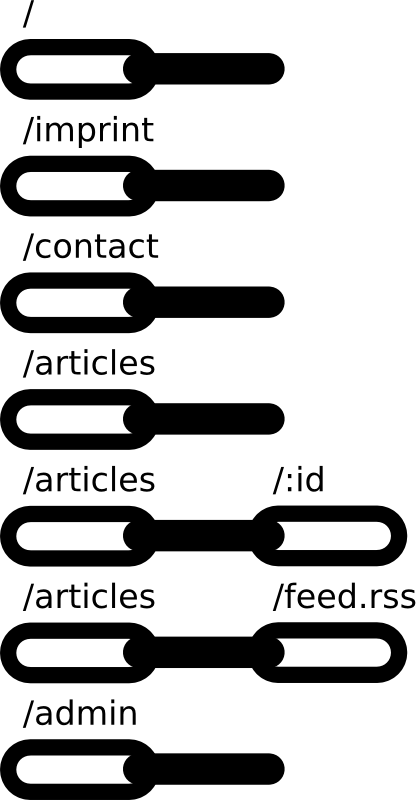

About myself

Ben Scholzen is …
- Freelancing Software Architect & Consultant
- Author and maintainer of core components in Zend Framework
- Open Source Contributor
The basic principle of routing
- Matching a request and extracting parameters
- Assembling new requests
The gibs of all routes
namespace Zend\Mvc\Router;
use Zend\Stdlib\RequestInterface as Request;
interface RouteInterface
{
public static function factory($options = array());
public function match(Request $request);
public function assemble(
array $params = array(),
array $options = array()
);
}
Route stacks
Using multiple routes together
Route stacks
- Collection of routes to match or assemble
- Based on priority stacks
- Implement the route interface
-
Types:
- SimpleRouteStack
- Http\TreeRouteStack
- Console\SimpleRouteStack
The Http\TreeRouteStack
- Takes care of base URL handling
- Provides functionallity for tree routing
- Helps assembling canocial URLs
Creating a new route stack
use Zend\Mvc\Router\Http\TreeRouteStack;
$router = TreeRouteStack::factory(array(
'routes' => array(
// …
)
));
or
$router = new TreeRouteStack();
$router->addRoutes(array(/* … */));
Handling the base path
- Base URL is used as offset for all routes
- Usually automatically set by ZF2
$router->setBaseUrl('/my/application');
Canonical URLs and the request URI
- Used for assembling canonical URLs without hostname routes
- Usually automatically set by when Router::match() is called
use Zend\Uri\Http as HttpUri;
$router->setRequestUri(new HttpUri('http://example.com'));
Default parameters
- One to rule them all
- Passed to any route when assembling
- Added to any match if not already set
$router->setDefaultParam('key', 'value);
$router->setDefaultParams(array(
'key' => 'value'
));
Assembling a route
- Route name is passed as option to the router
$url = $router->assemble(
array(), // Params
array('name' => 'bacon') // Options
);
echo $url; // /bacon
Assembling a canonical URL
$url = $router->assemble(
array(), // Params
array(
'name' => 'bacon',
'force_canonical' => true,
)
);
echo $url; // http://example.com/bacon
Matching a request
use Zend\Http\PhpEnvironment\Request;
$request = new Request();
$routeMatch = $router->match($request);
$routeMatch->getMatchedRouteName();
$routeMatch->getParams();
$routeMatch->getParam($name, $default = null);
Path routes
The basic route types
Literal route
- Simplest route type
- Matches and assembles literal strings
- Does not match any parameters
Literal route (example)
array(
'articles' => array(
'type' => 'literal',
'options' => array(
'route' => '/articles',
'defaults' => array(
'controller' => 'Application\Controller\Article',
'action' => 'index',
)
)
)
)
Regex route
- Fastest parameter-matching route type
- Matches based on a regular expression
- Assembles based on a replacement pattern
Regex route (example)
array(
'article-details' => array(
'type' => 'regex',
'options' => array(
'route' => '/articles/(?P<id>\d+)',
'spec' => '/articles/%id%',
'defaults' => array(
'controller' => 'Application\Controller\Article',
'action' => 'details',
)
)
)
)
Wildcard route
- Matches an unlimited amount of key/value pairs
- Allows to modify key/value and parameter delimiters
- Will assemble any parameters not used by parent routes
-
Not suggested to be used on public sites due to duplicate content
- /controller/index/action/index
- /action/index/controller/index
- Also has the disadvantage of no validation
Wildcard route (example)
array(
'wildcard' => array(
'type' => 'wildcard',
'options' => array(
'key_value_delimiter' => '/',
'param_delimiter' => '/'
)
)
)
The hero: segment route
- Most flexible route type
- Very fast matching, as segment patterns are internally converted to regular expressions
- Provides parameter matching based on delimiters and constraints
- Allows optional segments (both literal and parameter parts)
A basic segment example
array(
'article-details' => array(
'type' => 'segment',
'options' => array(
'route' => '/articles[/:id]',
'constraints' => array('articles' => '\d+'),
'defaults' => array(
'controller' => 'Application\Controller\Article',
'action' => 'index',
)
)
)
)
Structure of segment patterns
- Optional parts …
- … are denoted by square brackets
- … can be nested
- … can contain literal strings and parameters
- Parameters are prepended and optionally appended with a colon
- Default delimiter for parameters is a forward slash, but can be changed with curly brackets
Examples of segment patterns
-
/articles[/page-:pageNo]
Matches "/articles" and "/articles/page-1" -
/articles/[page-:pageNo]
Matches "/articles/" and "/articles/page-1" -
/articles/:id{-}-:slug
Matches "/articles/194-my-awesome-article", but also "/articles/foo/bar/baz-my-awesome-article" -
/conferences/:conference{0-9}::year
Matches "/conferences/zendcon2012" and "/conferences/dpc2010"
Tree routing
Or how to combine your routes
The history of routing
Traditional routing
/controller/action/key1/value1/key2/value2 …
-
Advantages
- Easy to use
-
Disadvantages
- Very inflexible
- Neither search-engine nor user friendly
- ZF < 0.6
- ZF 0.6 – 1.5
- ZF 1.6 – 1.12
- ZF 2.0
The history of routing
Fixed routing

-
Advantages
- Very flexible
- Search-engine and user friendly
-
Disadvantages
- Lots of repetition
- Slow, as many single routes need to be tested
- ZF < 0.6
- ZF 0.6 – 1.5
- ZF 1.6 – 1.12
- ZF 2.0
The history of routing
Chain routing

-
Advantages
- Easy to set up
- Chains themself were hidden
-
Disadvantages
- Lots of repetition
- Slow, as internally, every repeated branch was tested over and over
- ZF < 0.6
- ZF 0.6 – 1.5
- ZF 1.6 – 1.12
- ZF 2.0
The history of routing
Tree routing

-
Advantages
- Easy to set up
- Great performance
-
Disadvantages
- None known so far
- ZF < 0.6
- ZF 0.6 – 1.5
- ZF 1.6 – 1.12
- ZF 2.0
How tree routing works
- Every route can have an unlimited number of child routes
-
Child routes are only instantiated when the parent route matches or assembles

Tree specific routes
namespace Zend\Mvc\Router\Http;
use Zend\Mvc\Router\RouteInterface as BaseRoute;
interface RouteInterface extends BaseRoute
{
public function getAssembledParams();
}
The part route (classified internals)
- Automatically created whenever a route has defined child routes
- Consists of a base route and multiple child routes
- Usually never used directly by the user
Combining some routes
array(
'articles' => array(
'type' => 'literal',
'options' => array(
'route' => '/articles', 'defaults' => array(
'controller' => 'Application\Controller\Article',
'action' => 'index'
)
),
'may_terminate' => true,
'child_routes' => array(
'details' => array(
'type' => 'segment', 'route' => '/:id',
'constraints' => array('articles' => '\d+'),
'defaults' => array('action' => 'details')
) ) ) )
Assembling child routes
- Names of parent and child routes are separated with a forward slash
$router->assemble(
array(),
array('name' => 'articles/details')
);
Advanced route types
Matching everything which is not in the path
Hostname route
- Allows matching and assembling hostnames
- Provides simple parameter matching
Hostname route (example)
array(
'user' => array(
'type' => 'hostname',
'options' => array(
'route' => ':user.users.example.com',
'defaults' => array(
'controller' => 'Application\Controller\User',
'action' => 'index',
)
)
)
)
Scheme route
- Matches and assembles a specific scheme (http, https, …)
Scheme route (example)
array(
'secure' => array(
'type' => 'scheme',
'options' => array(
'scheme' => 'https'
)
)
)
Method route
- Matches one or more specific methods (GET, POST, PUT, …)
- Will do nothing on assembling
Method route (example)
array(
'non-get' => array(
'type' => 'method',
'options' => array(
'verb' => 'post,put'
)
)
)
Query route
- Converts any query parameter into a route match
- Like the wildcard route, it will assemble any parameters not used by parent routes
Query route (example)
array(
'query' => array(
'type' => 'query'
)
)
The router in your application
Making actual use of it
Defining routes in your config
return array(
'router' => array(
'routes' => array(
// …
)
)
);
Getting parameters in the controller
class BaconController extends AbstractActionController
{
public function indexAction()
{
$id = $this->params('id'/*, null */);
}
}
Redirecting within your controller
class BaconController extends AbstractActionController
{
public function indexAction()
{
$this->redirect()->toRoute(
'route-name',
array(), // Params
array() // Options
);
}
}
Assembling URLs in your controller
class BaconController extends AbstractActionController
{
public function indexAction()
{
$url = $this->url(
'route-name',
array(), // Params
array() // Options
);
$this->redirect()->toUrl($url . '#hash-tag');
}
}
Assembling URLs in your view
<a href="<?php echo $this->url(
'route-name',
array(), // Params
array() // Options
); ?>">Some Link</a>
A look into the future (2.1+)
- Route aliases
- Translatable segments
- Locale detection
Question?
Whatever you wanna know.
Thank You!
Rate this talk on joind.in: https://joind.in/6872
